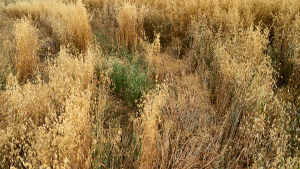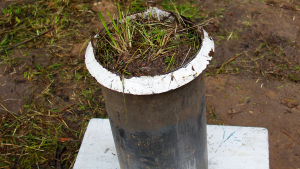Leadership and legacy
THREE BOARD MEMBERS END 12-YEAR TERM

FOR MORE THAN a decade, three names have been a constant on Grain Farmers of Ontario’s Board of Directors — Markus Haerle, Mark Huston, and Henry Van Ankum. 2022 marks the first year their names will be absent.
During the formation of Grain Farmers of Ontario, a 12-year term limit for directors was put into place. Representatives from the founding organizations (Ontario Corn Producers’ Association, Ontario Soybean Growers, and the Ontario Wheat Producers’ Marketing Board) felt this would ensure fresh perspectives within the leadership at the Board table. It is a principle that Haerle, Huston, and Van Ankum are all in full support of.
The three of them helped shape Grain Farmers of Ontario into the successful organization it is today, with a lasting legacy of supporting our farmer-members through the changing priorities and demands of industry, consumers, and government. Van Ankum (2012 – 2015) and Haerle (2018 – 2021) both served as chair for three years in addition to time on the Executive Committee, and Huston served as vice-chair for 10 years (2010 – 2020).
Ontario Grain Farmer spoke with each of them just before their director terms officially ended when the new Board came into effect at the beginning of February. The conversations have been edited for length and clarity.
MARKUS HAERLE, DISTRICT 14 (PRESCOTT, RUSSELL, STORMONT, DUNDAS, GLENGARRY)
What motivated you to remain a director for 12 years?
I had the backing from the district and also the backing from my family. Making my way up within the organization, joining the executive committee, and becoming chair gave me the incentive to stay engaged. It was not my goal in the beginning to become chair, but along the way I had other Board members mentor me and it became a natural progression for me. When the opportunity to be chair presented itself, I wanted to grab onto it as a personal challenge to take on.
The files and issues Grain Farmers of Ontario’s Board of Directors has to deal with are moving targets, we can never say going in that this is the definite path we will take. We were always trying to find the solution for the best possible outcome. Agriculture is evolving and growing and we have to grow with the challenges as they come around.
What do you feel is the most important role Grain Farmers of Ontario plays on behalf of farmer-members?
I am a strong believer we are always going to be the advocate for the farmer-member. That can be seen in different ways — towards government, towards finding new paths for our crops. We have to put actions behind the asks and the needs of the farmers. We as directors are elected by our membership so we have to give something positive back to them. But I have learned through the years you can never put a number behind a success, it’s never what you think it should be. We will never get a hundred per cent of what we ask for; we always strive for that, but it can be a modified version of what we asked for and that’s still as good.
What are some of the highlights from your time on the Board?
For me, it is the relationship building that I had the opportunity to do with politicians, industry stakeholders, company reps, and Grain Farmers of Ontario staff. For me it is all about teamwork, working with everyone to achieve the best possible outcomes.
I always felt it was very important to recognize the support of staff working with the board supplying information, giving direction on good ideas. As a board member, we rely heavily on staff to supply the important information on decisions we have to make, and I have great respect for them.
Within Grain Farmers of Ontario board committees, I really enjoyed the research side because that opened the door to a lot of different things that became important nationally. Market development gave great opportunities for me to promote our products that we produce in Ontario. We are a world player in certain markets that are very important for our farmers. That became obvious to me when I visited some of the Asian countries where our food grade soybeans end up, as well as the European Union. They all rely on some of our raw product to be their food and feedstock. We as Ontario have to be very proud that we became that source and let’s hope we maintain that as well.
Internationally, the International Oilseed Producers Dialogue provided an opportunity for international travel, and I met a lot of people that still today I feel I can reach out to any day and have a good dialogue about the issues we are facing and what they are doing.
What do you see as the biggest issue for grain farmers going forward?
The biggest challenge is to work with government to achieve the best possible outcome. Going back 12 years, it was somewhat easier to work with government because there weren’t that many issues downloaded to agriculture; in today’s world, ag is the target. That is still the biggest challenge for us — how can we work with that and still be positive and forward thinking and not just accept everything that is being thrown in front of us [for example, the federal carbon tax]. We don’t want to give in too easily to the ideas that government brings forward, because in the end that will be the final outcome if we give in. During my time as chair, government relations became Grain Farmers of Ontario’s main items to work on at all times. There is always something that needs to be done, the rest at the end of the day is important, but if we don’t mitigate the impact on the doorstep the government will dictate to us. That’s how I saw it evolve and I know our farmer-members are thinking the same as well.
What advice do you have for the new directors joining the Board?
Don’t be shy, say what you think. It is very important that board members around the table hear your opinion in the open forum of board discussion. Don’t be afraid to have the dialogue that is required. Grain Farmers of Ontario’s Board has always been very receptive to new members.
What are your future plans?
I will remain as a delegate for the next year at least, and give input at the local level. I have a lengthy to do list and plans for growing my farm business. I am at the age where it is important for the next generation to know what happens on the farm. My sons are in their mid-20s and they have to feel integrated, and I can only do that if I am there in person.
MARK HUSTON, DISTRICT 2 (KENT)
What motivated you to remain a director for 12 years?
It doesn’t really seem like it has been that long because the Board was always moving, always tackling new topics and new trends. Sometimes the things you started never seemed to get finished, especially on topics like Business Risk Management (BRM) which you always feel you can improve on. You have success on some files, and new ones come up, so it is a never-ending stream of work.
I don’t think I would have lasted this long unless I really enjoyed it — and I did. I was fortunate to serve the Board in external positions that allowed me to develop contacts across the industry, in different countries, and different areas of Canada. I have been far more places than I would have been able to go to on my own, and I hope I did good work while I was there.
Being on the executive as vice-chair was more work, but I never felt like I was committing more than what I had in me. As a member of the executive, I feel like I had influence on the direction of the organization, and I feel like I contributed a lot.
What do you feel is the most important role Grain Farmers of Ontario plays on behalf of farmer-members?
I think it is the ability to amplify the voice. Grain Farmers of Ontario has the ability to take what may be an issue for one small area of the province and scale it up to the federal level and even internationally. I represented Grain Farmers of Ontario and Soy Canada on a couple of international missions and being able to take a local issue to the embassy in China or Brussels and do work to try and resolve it is pretty powerful.
What was the biggest challenge during your time on the Board?
The time and effort away from the homefront were a challenge. I was lucky to have my uncle and my dad and cousin to be able to take some of the reigns on the farm away. My wife took on the family duties while I was away. But while that is the biggest challenge, the experiences are the biggest reward. Sitting down and talking to secretaries of state, having a friend down in the States, or being able to call someone in Brazil or China, those are connections I wouldn’t have been able to get especially as someone who is more introverted. It has pulled me out of my comfort zone a lot and that has been a good thing.
What do you see as the biggest issues for grain farmers going forward?
Twelve years ago, a carbon tax wouldn’t have even been something that we contemplated talking about, but over the last five to 10 years, the environment has really scaled up as far as the ability to move governments.
And I think that we are going to have some challenges financially from a farm standpoint. We have been lucky the last 12 years, with relatively good farm income, despite some ups and downs. The boom cycle can only last so long, so that is going to be one of the challenges we have to be ready to address. Issues like inflation, we are already seeing it on input prices. We are going to have to figure out how to make BRM programs work — programs that we could never get the government to commit to when times were good, how are they going to then commit when times aren’t as good?
What advice do you have for the new directors joining the Board?
I think my advice would apply to delegates in general. I was lucky that I started on the Board before a lot of big things in life hit me — I was single, I didn’t have any kids, I was in my 20s. I got to grow up with the organization and make it part of my life. With that, you can more easily adapt through different milestones. So, my encouragement is to start younger so you don’t build up the excuses you can sometimes come up with later in life. Don’t delay and wait for a better opportunity, because chances are, it is as good as it is going to get now.
Reaching out and gaining experience where you can is important. Get involved in as much as you can, as soon as you can. The longer you wait, changes the way you look at things.
What are your future plans?
I would like to stay involved as a delegate for the next few years to offer support as the new director gets their feet wet, but I don’t want to hold a delegate spot to prevent someone else from stepping up. We have a very engaged district committee and a lot of farmer-members who want to be involved.
There are a lot of things at home asking for more and more time now that I have a family. It will be nice to not have to worry about how to get enough internet bandwidth to participate in meetings at the same time my wife teaches her class, and the kids do their school from home. I don’t envision myself not being busy over the next few years, but I don’t have concrete plans. There are certainly things around the farm that are waiting to get done.
HENRY VAN ANKUM, DISTRICT 10 (GREY, BRUCE, WELLINGTON)
What motivated you to remain a director for 12 years?
I really enjoyed doing it, and enjoyed the camaraderie with the people I worked with. There were enough days where you thought you moved the needle to the positive side for our farmer-members that we represent, and it was quite fulfilling.
Being a board member was rewarding. I learned so much about our industry along the way. It was a really good experience. It made you learn how to manage your time sometimes, to balance requirements of being a director with your demands at home with the farm and family. You had to learn some time management skills but overall, it was a very rewarding experience.
I really enjoyed working with a lot of good people over the years, and the opportunity to build friendships and relationships with other growers across the country and internationally was a great part of the experience.
What are some of the highlights from your time on the Board?
People say I led the neonicotinoid issue; the way I look at it, I was just leading the organization when it came our way. It was one of the issues we dealt with while I was chair, but overall restrictive regulations and the trend towards that was certainly coming at us and was a challenge.
Government priorities were shifting towards an environmental agenda, and it was a challenge for us because there are a lot of repercussions to some of the things they want to do that can have an impact on farmers. I think we can hold our heads high on how we fought some of those battles against regulation.
I think getting the Risk Management Program and managing to keep it during a series of governments trying to trim budgets I certainly look on it as a success.
Just getting through the initial period of bringing the three organizations into one, I really look back on that. Going through all that change and transition and building a new identity as Grain Farmers of Ontario and seeing the organization flourish and gain momentum, to me is a real success.
A lot of opportunities open up to you as a member of the Board. I had the opportunity to meet with premiers and government ministers, various party leaders. I had the opportunity to represent Canada and soybean production at the International Oilseed Producers’ Dialogue conference a couple of times, I was involved in wheat promotion activities. Doors get opened to do some things you normally wouldn’t otherwise, including travelling to represent our growers here in Ontario.
What do you see as the biggest issue for grain farmers going forward?
The shift in government and consumer attitudes to some of our practices and governments promoting that environmentalist agenda, those have been some of our biggest challenges and I think they will continue to be going forward. We are going to have to adapt our practices to that lens as well as try and achieve some understanding on how we can’t achieve some of those things and still be efficient producers.
I look at advocacy, with government, with society, and consumers, and communicating about what we do, and why we need to do some of the things we do as one of the most important roles for our organization.
What advice do you have for the new directors joining the Board?
I would encourage them to fight hard for the issues we are trying to make change on. But you also have to remember you have to live to fight another day, that’s important too. Keep your eye on the long-distance view — what is our strategic plan, what are our long-range goals. Sometimes you have to look past the battle on a certain day and keep eye on the prize.
What are your future plans?
I plan to stay as a delegate for the short-term and see how it plays out. I want to certainly make room for new people to get involved too.
There have been lots of changes on our farm since I started getting involved on the Board and I’m looking forward to having more time for farming. I also have a couple of grandkids to enjoy now as well. And we will maybe take a few vacations once restrictions open up a bit more.
Rachel Telford is the manager of member relations for Grain Farmers of Ontario. •


























